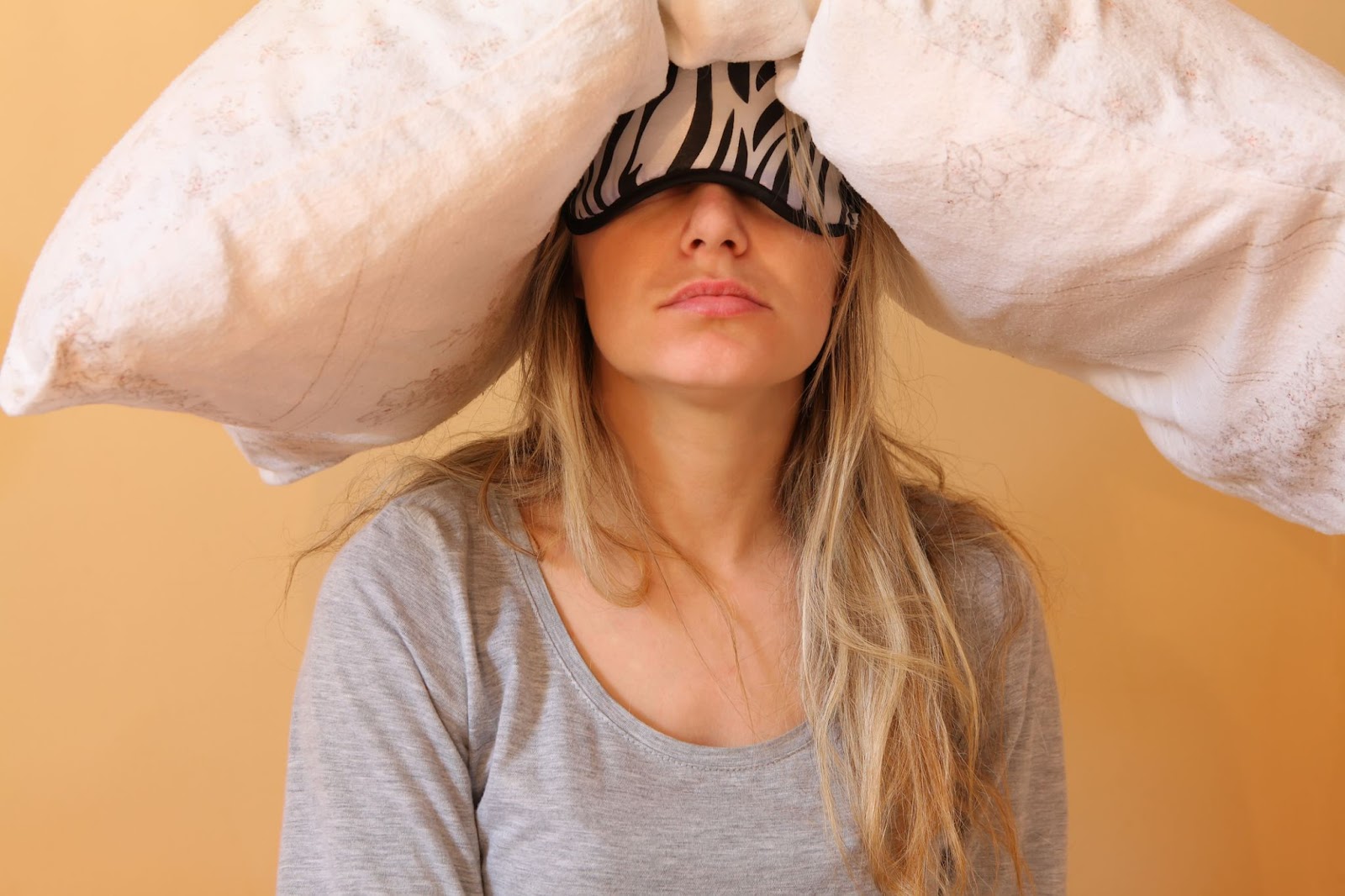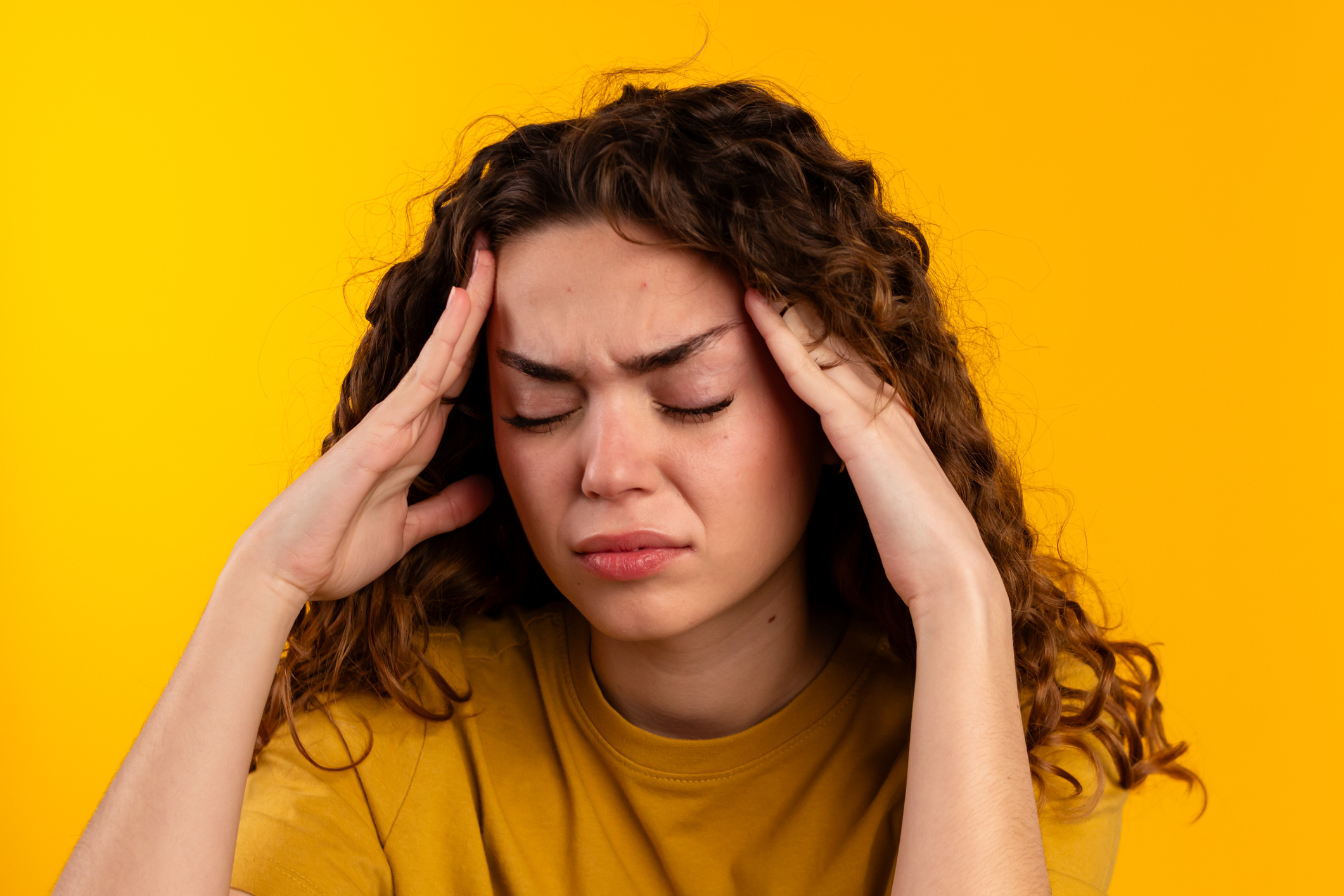Sleep
July 21, 2025
What Causes Morning Headaches?
Morning headaches can result from disrupted sleep, underlying health conditions, or unrecognized habits that affect your brain and body overnight. Sleep apnea, insomnia, teeth grinding, high blood pressure, and poor sleep posture are among the most common causes.
Alcohol, medication overuse, and irregular sleep schedules can also make you more likely to wake up with head pain. These headaches are often a signal that something overnight is straining the brain, nerves, or blood vessels.
What Types of Headaches Happen in the Morning?
Several headache types commonly strike in the early hours:
- Tension headaches are the most frequent. They usually feel like a tight band around your head and can result from muscle tension during sleep or stress-related clenching.
- Migraine headaches may be triggered by hormone changes, sleep deprivation, or alcohol use. They often come with nausea, sensitivity to light, and visual disturbances.
- Cluster headaches are less common but tend to wake people from sleep. These are excruciating, often centered around one eye, and occur in clusters for days or weeks.
- Hypnic headaches, sometimes called “alarm clock headaches,” are rare but specific to nighttime or early-morning hours. They typically affect people over 50.
- Medication-overuse headaches can occur after nightly use of pain relievers or caffeine-containing drugs, leading to rebound pain upon waking.
Knowing the type of headache helps guide treatment. Cluster headaches may need oxygen or triptans. Tension headaches respond to lifestyle changes and physical therapy. Migraines often require preventive medications.
How Does Poor Sleep Quality Trigger Morning Headaches?
Sleep disruptions interfere with pain-regulating systems in the brain. During restful sleep, the body balances serotonin, dopamine, and melatonin, chemicals that regulate mood, pain, and inflammation. Fragmented sleep lowers pain thresholds.
According to the American Migraine Foundation, people with chronic migraines are two to eight times more likely to have a sleep disorder (1). Sleep deprivation increases cortical excitability, which can trigger a migraine. Waking multiple times, staying in light sleep stages, or having short sleep duration means the brain doesn't get the restorative time it needs to reset pain sensitivity.
Can Snoring or Teeth Grinding Cause Headaches?
Loud snoring is a common symptom of obstructive sleep apnea (OSA), which repeatedly interrupts breathing during the night. Each pause causes a drop in oxygen and a spike in carbon dioxide, triggering headaches. About 48% of patients with obstructive sleep apnea in one study reported waking up with headaches, and the likelihood and severity of these headaches increased with the severity of their OSA (2).
Bruxism, or nighttime teeth grinding, puts excessive pressure on the temporomandibular joints and facial muscles. This tension can cause a dull headache across the temples or behind the eyes. Often, patients aren’t aware they grind their teeth until a dentist sees the signs. Jaw soreness or worn-down enamel may be clues. A bite splint or mouthguard often relieves the pressure and protects the teeth.
Is Sleep Posture a Hidden Cause?
Poor sleep posture strains neck muscles and cervical nerves. Side or stomach sleeping with misaligned pillows can compress blood flow or pinch nerves, leading to tension-type headaches.
Key contributors include:
- Sleeping on a high pillow that bends the neck forward
- Twisting the spine unnaturally
- Using no pillow at all, reducing support for the cervical spine
Proper alignment, neutral neck posture, a supportive pillow, and a mattress that keeps your spine aligned reduce musculoskeletal strain that triggers headaches.
What Role Do Lifestyle Factors Play?
Daily habits can directly influence your chances of waking up in pain. Skipping meals, dehydration, poor sleep hygiene, or alcohol before bed all contribute.
Key lifestyle factors include:
- Alcohol: Especially red wine and beer, which dilate blood vessels and disrupt REM sleep
- Caffeine: Dependence or late-night use can either trigger or prevent withdrawal headaches
- Screen time: Prolonged blue light exposure before bed lowers melatonin, fragmenting sleep
- Stress: Triggers nighttime muscle tension and disrupts deep sleep stages
Individuals with inconsistent sleep schedules, characterized by going to bed and waking up at drastically different times, may be at a higher risk of experiencing morning headaches. Keeping a regular sleep-wake time helps regulate both sleep quality and headache frequency.
Could High Blood Pressure Be the Culprit?
Yes, but it depends on severity. Mild or moderate hypertension rarely causes head pain. However, dangerously high blood pressure (systolic ≥180 mm Hg or diastolic ≥120 mm Hg) can cause early-morning headaches, typically described as throbbing or pulsating. These may come with chest pain, shortness of breath, blurred vision, or nosebleeds.
This happens because blood pressure naturally rises before waking (the "morning surge"). For people with uncontrolled hypertension, this surge can overstretch blood vessels in the brain and trigger pain. Morning headaches that occur regularly should prompt a blood pressure check. Antihypertensive therapy may reduce both cardiovascular risk and headache episodes.

Are Morning Headaches Ever a Sign of Something Serious?
There are also some medical conditions that can cause morning headaches and may need medical attention:
- Idiopathic intracranial hypertension: This condition raises pressure inside the skull and often causes headaches on waking. It tends to occur in women of childbearing age with higher body weight. Some people also report blurred vision or ringing in the ears.
- Carbon monoxide exposure: Long-term exposure during sleep may result in a dull, lingering headache in the morning, particularly in spaces with poor airflow or faulty gas appliances.
- Giant cell arteritis: This condition causes inflammation in the blood vessels of the head and is more common in adults over 50. Head pain on waking, scalp tenderness, and jaw discomfort are possible signs. Quick diagnosis is important to protect vision.
- In rare cases, a brain tumor can cause persistent morning headaches. These may gradually worsen over time and feel more intense when lying down. Although this cause is uncommon, it’s still important to speak with a doctor if your headaches become more frequent, more painful, or different than usual.
Red flags include vomiting without nausea, neurological symptoms, stiff neck, vision problems, or headaches that increase in frequency or intensity. If any of these are present, immediate medical evaluation is essential.
How Are Headaches and Sleep Disorders Connected?
Sleep and headache disorders share overlapping neural pathways. Both are regulated by the hypothalamus, a brain region that controls sleep-wake cycles, pain, and hormone release. Disrupted sleep lowers pain thresholds and alters neurotransmitter levels, making the brain more sensitive to headache triggers. Poor sleep affects how the brain regulates inflammation and stress responses. Inflammatory markers such as interleukin-6 and TNF-alpha increase with chronic sleep disruption, which may sensitize pain pathways. Sleep quality and headache severity often rise and fall together.
What Sleep Disorders Cause Morning Headaches?
Several sleep disorders are directly tied to morning headaches:
- Obstructive sleep apnea (OSA): Untreated OSA is a leading cause of morning headaches and can also contribute to hypnic headaches and chronic migraines. Breathing repeatedly stops during sleep, lowering oxygen and increasing carbon dioxide. This can cause a dull, bilateral headache that usually improves within a few hours.
- Insomnia reduces restorative sleep stages, which interferes with the brain’s ability to regulate pain. It also increases muscle tension and stress hormones that trigger tension-type headaches.
- Bruxism, or teeth grinding, places strain on facial and neck muscles during the night, leading to pressure-type headaches in the morning.
- Circadian rhythm sleep disorders, such as delayed sleep phase disorder, disrupt hormone release and cause fragmented, low-quality sleep, which often results in head pain after waking.
Sleep-related movement disorders like restless legs syndrome and periodic limb movement disorder may also disturb sleep architecture, indirectly contributing to headache frequency.
Why Morning Headaches Deserve Real Evaluation
Morning headaches often go ignored or self-treated. But frequent episodes signal something deeper, either a medical, neurological, or sleep-related issue. Without evaluation, you risk treating the symptom while the real cause continues unchecked.
A full sleep and headache history helps connect the dots. Clinicians may assess:
- Sleep patterns, including timing, duration, and disruptions
- Breathing symptoms such as gasping, loud snoring, or witnessed apneas
- Jaw clenching or dental wear patterns
- Neurological signs or visual changes
- Blood pressure trends over 24 hours
Diagnostic tools include overnight polysomnography, actigraphy, and sometimes brain imaging. A detailed evaluation rules out serious issues and helps prevent progression to chronic daily headache.
How to Sleep Smarter to Reduce Headaches
Improving sleep quality is one of the most effective ways to reduce morning headaches. The goal is consistent, restorative sleep that keeps your brain's pain-regulation system stable. Evidence-based strategies include:
- Stick to a set sleep-wake time, even on weekends
- Avoid screens and bright light 1–2 hours before bed; blue light suppresses melatonin and delays sleep onset
- Use blackout curtains or an eye mask to prevent early-morning light disruption
- Limit caffeine after midday; it interferes with deep sleep
- Address snoring or teeth grinding with a medical evaluation or dental appliance
- Choose the right pillow; your head should stay in a neutral, aligned position all night
Many people see improvement in both headache frequency and intensity within a few weeks of improving sleep hygiene.
Take the Sleep Assessment Trusted by People Who Want Answers
If you wake up tired, foggy, and in pain, it's not something to brush off. Morning headaches may be your body’s way of pointing to a sleep disorder that’s been overlooked.
Nightly’s free online assessment screens for common causes of disrupted sleep, including insomnia and sleep apnea, two of the top drivers of early-morning headaches.
It’s short and it helps you find out what’s likely behind your symptoms so you can take action that actually works. Try it now.
References
- Sleep Disorders and Headache | American Migraine Foundation. (2022, December). American Migraine Foundation. https://americanmigrainefoundation.org/resource-library/sleep/
- Loh, N. K., Dinner, D. S., N. Foldvary, F. Skobieranda, & Yew, W. W. (1999). Do Patients With Obstructive Sleep Apnea Wake Up With Headaches? Archives of Internal Medicine, 159(15), 1765–1765. https://doi.org/10.1001/archinte.159.15.1765

